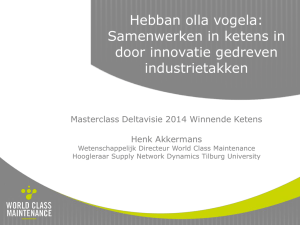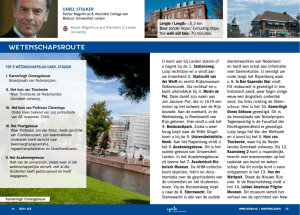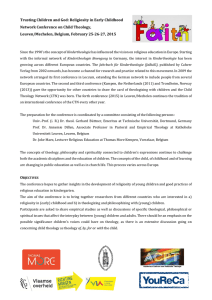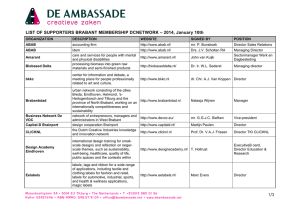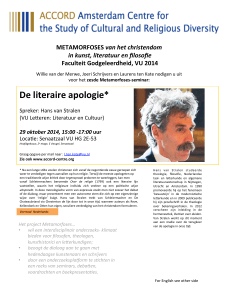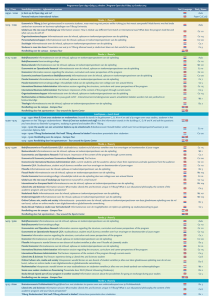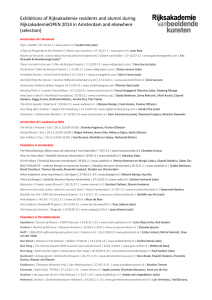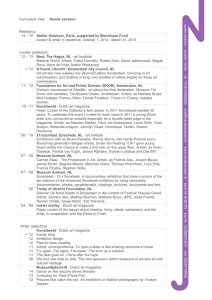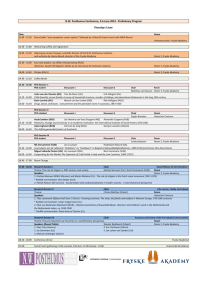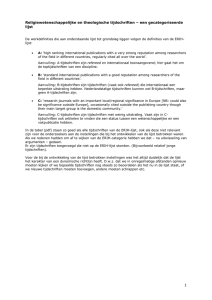(pdf). - Centrum voor Patristisch Onderzoek
advertisement
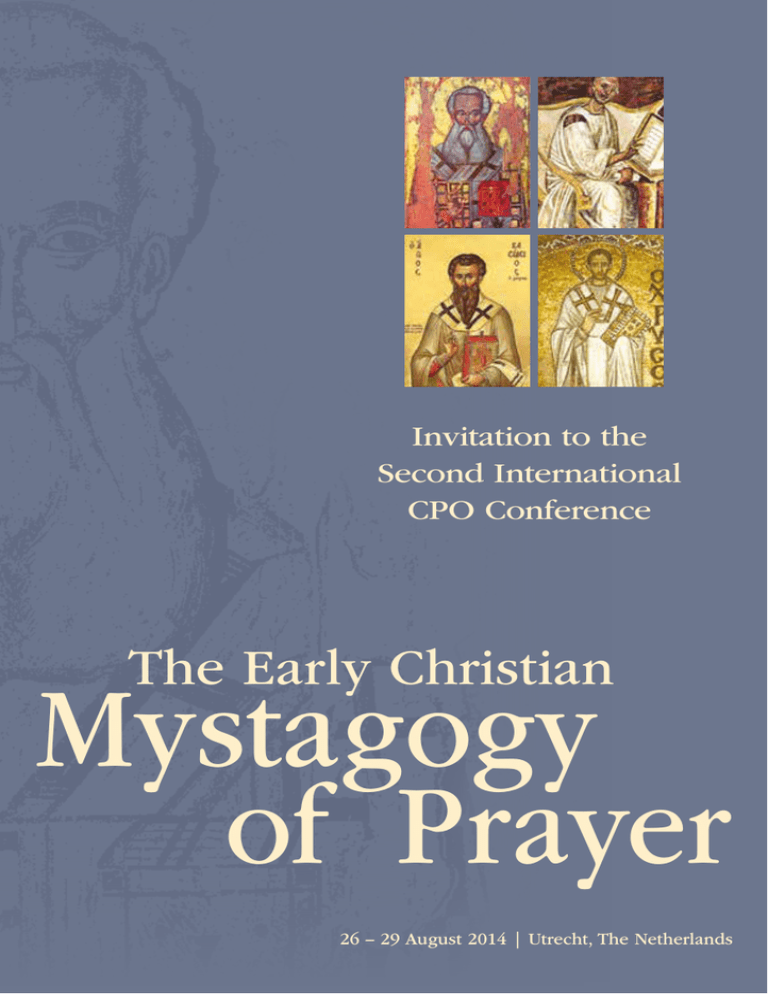
Invitation to the Second International CPO Conference The Early Christian Mystagogy of Prayer 26 – 29 August 2014 | Utrecht, The Netherlands 2 In de laatste tien jaar is wereldwijd interesse gerezen voor het onderwerp ‘mystagogie’. In de vroege kerk duidde de term op de inwijding van dopelingen in gebeden, geloofsartikelen en religieuze gebruiken die voor de buitenwereld onbekend bleven: de ‘mysteriën’. In een meer brede zin worden met mystagogie ook transformatieprocessen aangeduid die geestelijke schrijvers in de eerste eeuwen van het christendom ontwikkelden om een individu ontvankelijk te maken voor de omgang met het goddelijke. Weliswaar lijken wetenschappers die deze processen bestuderen heden ten dage haast ‘veroordeeld’ door inzichten uit de neurologie om hun onderzoek te duiden in het perspectief van de programmering van het brein door de overdracht van religieuze ideeën. Het determinisme van de neurologische visie lijkt het onmogelijk te maken mystagogische traktaten te beschouwen vanuit het doel waarmee zij zijn geschreven. God is immers niet meer dan een product van de geest die op zijn beurt weer een product is van het brein. Toch leidt de neurologie slechts tot het besef dat iedere uitspraak over God vanuit dit vak eigenlijk een uitspraak is over een godsbeeld in het brein. Maar zij kan niets zeggen over het bestaan van God als zodanig. De mogelijkheid dát er meer is dan de mens in zijn brein aan kennis, kunde en inzichten over God en wereld produceert, heeft kerkvaders in de eerste eeuwen van het christendom bewogen in het kader van hun mystagogie te spreken over de plaats en betekenis van ‘gebed’. De tweede internationale CPO-conferentie is daarom gewijd aan ‘De vroegchristelijke mystagogie van het gebed’. ‘Gebed’ als onderdeel van inwijding en transformatie kan verschillende vormen aannemen: er is zowel individueel als gemeenschappelijk-liturgisch gebed, vraaggebed en dankzegging, stilte en meditatie, verootmoediging en belijdenis. In de bijdragen aan dit congres wordt de historische, theologische, literaire, religieuze en culturele context waarin gebed haar omvormende kracht ontvouwt eveneens in ogenschouw genomen. Steeds is de vraag: welke effecten op het terrein van kennis, affectie en gedrag wilden de kerkvaders bereiken wanneer zij spraken en schreven over gebed? The past ten years the subject of ‘mystagogy’ has received increasing world-wide interest. The early Church used the term for the instruction of the baptized in formalized prayers, dogma, and rituals that were kept hidden from the outside world: the ‘mysteries’. More broadly, the term also points to the transformational processes which early Christian authors envisioned to make an individual receptive to communication with the divine. Today, the results of neurological research almost seem to oblige scholars studying these processes to interpret their findings in the context of the programming of the brain through the transmission of religious ideas. The determinism inherent in the neurological view seems to make it impossible to approach these mystagogical treatises from the point of view from which they were written: for God is held to be a product of the mind, which in turn would be a product of the brain. In fact however, the neurological view shows only that every statement about God from this vantage point is a statement about the image of God in the brain. It does not say anything about the existence of God as such. The possibility that more exists than the human brain can conceptualize or envision as insights about God and the world motivated the Church Fathers in the first centuries of Christianity to speak in their mystagogical treatises of the function and meaning of ‘prayer’. The second CPO conference therefore focuses upon ‘The Early Christian Mystagogy of Prayer’. As an element in Christian initiation and transformation, ‘prayer’ can take on different forms, individual as well as collective: as petition and thanksgiving, silence and meditation, contrition and confession. The contributions to this conference also consider the historical, theological, literary, religious, and cultural contexts in which prayer exerted its transformational power. The central question is: what effects did the Church Fathers want to achieve in the spheres of knowledge, the affective life, and behaviour, when they spoke and wrote about prayer? 3 Pro gram me Tuesday Evening August 26th (In Dutch) 19.30 Academiegebouw: Maskeradezaal Inloop 20.00 Academiegebouw: Senaatszaal Opening en introductie Paul van Geest (Tilburg University/Vrije Universiteit) 20.30 Academiegebouw: Senaatszaal Publiekslezing “Bidden en het brein” Frans van der Meché (Erasmus UMC Rotterdam) 4 5 21.30 Academiegebouw: Maskeradezaal Receptie Wednesday August 27th 9.30 (In English) Museum Catharijneconvent: Foyer Auditorium Start with coffee and tea 10.00 Programme 26 – 29 August 2014 Museum Catharijneconvent: Auditorium Plenary lecture Initiation of the Community and the Individual by Prayer. The Formation of an Early Christian Tradition Gerard Rouwhorst (Tilburg University) 11.00 16.00 Museum Catharijneconvent: Foyer Auditorium Coffee break 11.30 – session 1 16.30 – session 4 Museum Catharijneconvent: Auditorium West and East: Prayer and Cosmos in Augustine and Maximus Confessor Willemien Otten (University of Chicago) Museum Catharijneconvent: Grachtenzaal How Do We Learn to Address God as Father? A Comparison Between Rabbinic and Patristic Sources Marcel Poorthuis (Tilburg University) 12.30 6 Museum Catharijneconvent: Foyer Auditorium Coffee break Museum Catharijneconvent: Museumcafé Lunch 14.00 – session 2 Tilburg School of Catholic Theology: Room 006 The Lord’s Prayer as a Mystagogical Testimony. Did Augustine Interpret the Pater Noster Consistently? Marten van Willigen (PThU Amsterdam/Tilburg University) Tilburg School of Catholic Theology: Room 105 ‘So on Earth’: Liturgy from Heaven Henk Bakker (VU University) 15.00 – session 3 Tilburg School of Catholic Theology: Room 006 Prayer and Fasting in Cyril of Alexandria’s Festal Letters Hans van Loon (Tilburg University) Tilburg School of Catholic Theology: Room 105 Why Pray? Augustine of Hippo’s Mystagogical Understanding of Sapientia as True Worship Anthony Dupont and Matthew Knotts (KU Leuven/Research Foundation Flanders) Tilburg School of Catholic Theology: Room 006 ‘Remember me’: Mystagogical Functions of Prayer in Early Christian Lives of Saints Nienke Vos (VU University) Tilburg School of Catholic Theology: Room 105 The Interdependence of Revelation and Prayer in Clement of Rome to the Corinthians Benno Zuiddam (Greenwich School of Theology, North West University) 17.30 – session 5 Tilburg School of Catholic Theology: Room 006 Desert and Other Traditions of Prayer in Gregory of Tours’ Life of the Fathers Giselle de Nie (Utrecht University) Tilburg School of Catholic Theology: Room 105 Prayer and Participation in the Eucharist in the Work of Ignatius of Antioch Peter Ben Smit (VU University/Utrecht University) 18.30 Academiegebouw: Foyer Dinner (speakers only) 20.00 Academiegebouw: Senaatszaal Plenary lecture The Lord’s Prayer as Mystagogy from Origen to Maximos Andrew Louth (Durham University [UK], VU University) 21.00 Academiegebouw Drinks 7 Thursday of Congruity between Interior and Exterior Man Martin Claes (Tilburg University) August 28th 9.30 (In English) Museum Catharijneconvent: Foyer Auditorium Start with coffee and tea 10.00 Museum Catharijneconvent: Auditorium Plenary lecture ‘The Desert’, Sensory Delight, and Prayer in the Augustinian Revival of the Twelfth Century: The Case of Pierre de Celle Mary Carruthers (New York University) 11.00 8 Museum Catharijneconvent: Foyer Auditorium Coffee break 11.30 – session 6 Museum Catharijneconvent: Auditorium Augustine’s Longings for God in his Prayer to the Holy Trinity (De Trinitate XV.28.51) Laela Zwollo (Tilburg University) Museum Catharijneconvent: Grachtenzaal John Chrysostom on Prayer and Song, Music, and Dance Henk van Vreeswijk (Tilburg University) 12.30 Museum Catharijneconvent: Museumcafé Lunch 14.00 – session 7 Tilburg School of Catholic Theology: Room 006 The Mystagogical Function of the Virginity Imagery in the Prayers Ending Ambrose’s De Institutione Virginis and Exhortatio Virginitatis Metha Hokke (Tilburg University) Tilburg School of Catholic Theology: Room 105 Unity and Similarity in Life and Prayer. Correspondences between St. Anthony’s oratio perpetua and Augustine’s Ideal 15.00 – session 8 Tilburg School of Catholic Theology: Room 006 The Noetic and Cardiac Psychologies of Prayer as part of the Mystagogical Habitat of the Greek Fathers Michael Bakker (VU University) Tilburg School of Catholic Theology: Room 105 Praying Without Words in Augustine and his Mystagogy Paul van Geest (Tilburg University) 16.00 Museum Catharijneconvent: Foyer Auditorium Coffee break 16.30 – session 9 Tilburg School of Catholic Theology: Room 006 Praying and Prayers in Gregory the Great’s Letters. Exploring Mystagogical Meaning in Functional Texts Arnold Smeets (Tilburg University) Tilburg School of Catholic Theology: Room 105 Spiritui requies adquirenda est: Augustine and the Prayer for the Deceased Paula Rose (VU University) 9 18.00 De Rechtbank Dinner (speakers only) 20.00 (In Dutch) De Rechtbank: Auditorium Fireside Talk: gesprek over een leven tussen kloostergemeenschap, wereldkerk en patristiek Michel Van Parys OSB (Chevetogne/Grottaferrata), geïnterviewd door Monic Slingerland (Trouw) 21.00 De Rechtbank: Auditorium hall Reception Friday General Information August 29th 9.30 (In English) Museum Catharijneconvent: Foyer Auditorium Start with coffee and tea 10.00 – session 10 Museum Catharijneconvent: Auditorium The Matrix of Prayer, Humility, and God’s Vindication in Greek Ascetical Literature (4th - 8th centuries) Joseph Lucas (VU University, St. Tikhon’s Orthodox Seminary) Museum Catharijneconvent: Grachtenzaal Lex orandi, lex credendi? The Evidence of the Sermones in traditione orationis in the Latin West Liuwe Westra (Tilburg University) 10 11.00 Museum Catharijneconvent: Foyer Auditorium Coffee break 11.30 (In Dutch) Museum Catharijneconvent: Auditorium Publiekslezing Basileios van Kaisareia, het Woord Gods leert ons bidden Michel Van Parys OSB (Chevetogne/Grottaferrata) 12.30 Museum Catharijneconvent: Auditorium Afsluiting Paul van Geest (Tilburg University) Gratis bijwonen plenaire sessies in het Nederlands De openingslezing (Frans van der Meché) en de slotlezing (Michel Van Parys) zijn vrij toegankelijk. Ook het bijwonen van de Fireside Talk met Monic Slingerland en Michel Van Parys is gratis. Registration Fee The registration fee for the entire conference, including all plenary lectures and expert meetings, is € 120,-. This also includes lunch on Wednesday and Thursday. All registrations can be made at http://tiu. nu/cpocongres. (Paying participants will receive a formal invoice.) Students with valid university pass have free access to all sessions. Venue The conference will take place in the historical city centre of Utrecht. The various locations of the lectures and sessions are all within walking distance. These are specified in the programme (above). The full addresses are: - Academiegebouw, Domplein 29, 3512 JE, Utrecht - Museum Catharijneconvent, entrance Nieuwegracht 63, 3512 LG, Utrecht - Tilburg School of Catholic Theology, Nieuwegracht 65, 3512 LG, Utrecht - De Rechtbank (restaurant), Korte Nieuwstraat 14, 3512 NM, Utrecht Publication A collection of papers presented at the conference will be published in the academic series Late Antique History and Religion (Peeters Publishers, Leuven, Belgium). Please check the CPO website (http:// www.patristiek.eu) for news. Sponsors The conference has been made possible by special funding of Tilburg University, VU University Amsterdam and the Dutch Province of the Order of the Augustinians. 11 Het Centrum voor Patristisch Onderzoek De internationale conferentie ‘The Early Christian Mystagogy of Prayer’ is een initiatief van het Centrum voor Patristisch Onderzoek (CPO). Het CPO werd in 2007 opgericht door de Universiteit van Tilburg en de Vrije Universiteit Amsterdam om samenwerking te bevorderen op het gebied van patristisch onderzoek. In het CPO doen theologen, godsdienstwetenschappers, filologen en classici van diverse levensbeschouwelijke achtergrond onderzoek naar de vroege kerk in haar historische en culturele context. In de tijd van de kerkvaders ontwikkelde het christelijke denken over God, de mens, de samenleving en de schepping zich snel. Het christendom kreeg voor het eerst vorm. Vanaf het eerste begin werd de nieuwe godsdienst mede gevoed door de toenmalige culturele en filosofische stromingen. Naarmate de positie van de kerk sterker werd, ging zij op haar beurt ook cultuur en maatschappij beïnvloeden. Veel van de discussies en ontwikkelingen van toen zijn daarom ook nu nog van belang. Bij zijn oprichting heeft het CPO de mystagogische aspecten van het vroegchristelijke leven aangewezen als kernthema voor zijn onderzoek en activiteiten. Het thema overstijgt de grenzen van kerkelijke denominaties en wetenschappelijke disciplines en sluit aan bij een nieuwe interesse in spiritualiteit. De leden van het CPO publiceren de resultaten van hun onderzoek in internationale wetenschappelijke tijdschriften, (congres-)bundels, lexica en boeken. Voorts organiseert het CPO regelmatig lezingen, symposia en congressen. www.patristiek.eu | info@patristiek.eu The Centre for Patristic Research The international conference ‘The Early Christian Mystagogy of Prayer’ is an initiative of the Centre for Patristic Research (CPO; Centrum voor Patristisch Onderzoek). The CPO is a centre for cooperation in patristic studies founded in 2007 by Tilburg University and VU University Amsterdam. At the CPO, theologians, philologists, classicists, and researchers in the field of religious studies of various religious backgrounds cooperate in scholarly research with respect to the Early Church and its historical and cultural context. In the age of the Church Fathers, Christian thinking about God, man, society, and creation developed at a great pace. It was then that Christianity first took shape. From the beginning the new religion was also nourished by the cultural and philosophical tendencies of the age. As the position of the Church got stronger, however, it also began to influence culture and society. Therefore many of the discussions and developments that took place at the time are still relevant today. Shortly after its foundation, the CPO identified the mystagogical aspects of early Christian life as the core theme of its research and other activities. This theme transcends the boundaries of both church denominations and academic disciplines and fits the current interest in spirituality. CPO members publish the results of their research in international scholarly journals, compilations of (congress) papers, lexica and books. In addition the CPO regularly organises lectures, symposia and congresses. www.patristiek.eu | info@patristiek.eu
